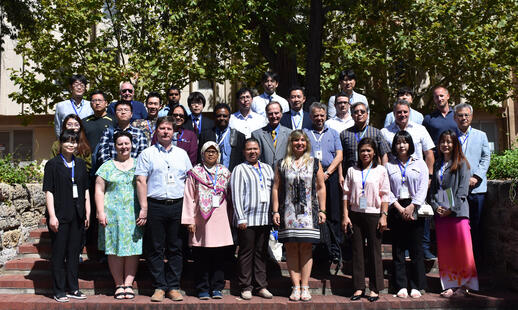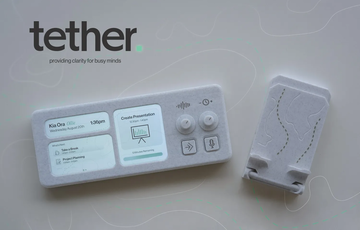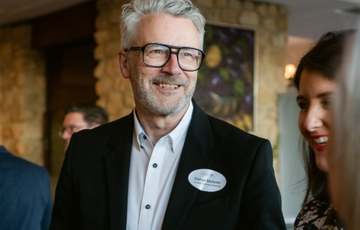MDS Student attends the ‘International Conference on Virtual and Augmented Reality Simulations’ to present his research
Ian Moh, recent graduate of the Bachelor of Software Engineering and currently completing his Graduate Diploma of Creative Technologies at MDS, attended the ICVARS Conference in Perth. We sat down with him to hear about his paper, his experience at the conference, and where he plans to take his research next.
What was ICVARS all about? What sort of research topics were discussed?
It’s a consortium where people in their field can gather & share their research. It gives the opportunity for diverse niches to come together and share their research. A large part of it is to cross pollinate and share your different ideas. We had topics that ranged from image processing to data cryptography. The section I was in was Virtual Reality. I didn’t realise how diverse the different fields were. There was person who was doing research into using AR sensors to find people’s sleeping patterns.
Can you give us a quick summary on what your paper is about?
My paper is about cinematography in video games – particularly the field I focused on was spatial distortion. It was about realistic lens cinematography in video games. The whole purpose of the paper was to explore one aspect that can bring video games and cinematography closer. I come from a film background so I can understand certain aspects that are misread in videogames, as a result there are places where you can focus on & improve to make the game more immersive.
How did you enjoy the conference? What aspects of it left an impression?
I was really captivated by the sincerity and the effort of my fellow presenters. I didn’t have any expectations but when I arrived I saw people who had spent years of their lives dedicated to their papers they were presenting. There was a real sincerity to it and I found that really endearing. At the end of the conference, I didn’t plan to do this, but I did thank them for being part of my research. Being around them all, it makes you want to do your best as well. The other thing that left an impression on me was how much our little corner of the world can actually hold our own in a world stage battle. Seeing these intense and highly intelligent papers about AI algorithms that interpret speech to help you interview better and virtual cryptography to find fake news – and I’m presenting my paper watching these same people take notes and ask me questions later. It blew me away and put into perspective what I’ve been doing at Media Design School these last three years.
Going to the conference was my first time seeing creativity in an academic field. It was a very new experience for me and it was extremely eye opening. It showed me a new side of creativity; the disciplined, academic side. Surprisingly research is a lot about community and team work – the way you write your paper you always use ‘we’, ‘they’, and you acknowledge people from the past.
How did MDS help you with your research? What was it like working alongside Fawad Zaidi, (MDS Senior Lecturer, Bachelor of Software Engineering), to develop your paper?
MDS took my passionate curiosity and channeled it in ways that are practical and made a difference in the real world. Fawad was really significant – he didn’t just open doors for me he mentored & guided me over the holidays about how to write a research paper, the right things to say and what to do when we got to the conference. It was a brand-new area of study that I’d never seen before. Without Fawad I wouldn’t have had the opportunity to speak there, let alone understand where research fits in the creative field. Having just graduated, MDS showed me that it if you’re determined and have the motivation it’ll take your passionate curiosity and put legs on it.
What was your favourite research topic discussed at the conference?
There was a Japanese man, who didn’t speak much English, who then goes up on stage and presents for 15 minutes in perfect English. It was mind blowing how much he must have practiced. His research paper was about job interviewees and how he could help them – what he developed was a virtual reality programme that simulated an interview experience, it would ask you questions and his research was writing an AI that understood the answers you gave and created leading questions from the answers you provided. That was his three years Masters and it blew me away how passionate he was in his field. It helped show me how I can contribute to the research community.
How did your presentation go?
My presentation went really well, I had a lot of people come up to me afterwards and tell me that my presentation was one of their favourites and they’d like to hear more. I received a lot of business cards and emails from people. It was encouraging!
It was the same people whose presentations I’d been watching and thinking ‘these guys are incredible and know their stuff, they are researching cutting edge topics’. It was amazing that they were interested in my work also.
What ideas were you exposed to at the conference that will change the way you approach your research in the future?
The entire conference was about how to extend not just your research but your creative journey. It’s not so much about how to go about research but it was being exposed to different areas that you wouldn’t have been exposed to if you weren’t at a place like this. A large part of creative exploration is finding a new idea, latching on to it and then seeing where you go with it. This conference was a whole bunch of people who had latched onto an idea and just explored it. Being surrounded by that gave me lots of ideas that I can go forward with.
Where to from here? Will you continue to further explore the studies discussed in your paper?
This research paper was on virtual cinematography in games, I want to extend my research to VR games. Through my postgraduate diploma we will be exploring VR for our main topic so I’d like to explore further research in this area. Being at this conference has definitely inspired me to write another research paper.
Ian would like to conclude with an acknowledgement to his lecturers, who helped get him where he is today:
Fawad Zaidi – he was a huge part of the reason I was attending the conference. I wouldn’t have had the opportunity without him.
Asma Shakil – who in 15mins can compress the world’s knowledge of C++
Bindu Ojha – who was very savvy in explaining algorithms and data processes in a way that is intuitive and easy to understand.
Ivan Khmel, Aslihan Tece Bayrak & Jordan Browne – A lot of insight and brutal honesty into what makes a good game and what makes a terrible one.
Alex Legg & John Wei – I’m working with Alex and John now for Post-Grad. We’ve only just started but we’ve already begun to explore ideas of where I want to go forward. With their experience & expertise I’ll spend the next year researching Virtual Reality.
All of my lecturers have been incredible at harnessing your enthusiasm and using their experience & knowledge to then guide you. MDS has been a really good place for incubating creatives – from hopes & dreams to being able to practically express yourself in the real world. None of this could have happened without them.



